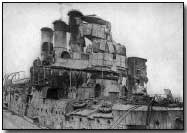Who's Who - Alfred Carpenter
 Admiral Alfred Francis Blakeney
Carpenter (1881-1955) served with the British Royal Navy during the First
World War and was awarded the
Victoria Cross for his actions in the British
raid upon
Zeebrugge in March 1918.
Admiral Alfred Francis Blakeney
Carpenter (1881-1955) served with the British Royal Navy during the First
World War and was awarded the
Victoria Cross for his actions in the British
raid upon
Zeebrugge in March 1918.
Prior to the First World War Carpenter saw naval service in Crete in 1898 and during the Boxer Rebellion of 1900-01. He was promoted Lieutenant Commander in 1911 and served on Sir John Jellicoe's staff during 1914-15. The following year he was promoted commander and served on a battleship until 1917.
In 1917 Carpenter served with the Admiralty Planning Staff, working with Admiral Roger Keyes in planning attacks upon the German installations at Zeebrugge and Ostend. It was via this connection that Carpenter was handed command of HMS Vindictive in the daring British plan to close the German ports of Zeebrugge and Ostend in April 1918. This was to be achieved by the deliberate scuttling of British vessels in the mouth of the port, thus preventing German shipping from passing to or from the port.
HMS Vindictive was herself to land British troops intended to destroy the German shore batteries. In poor sea conditions however and worse visibility (the raid was conducted under cover of darkness) Vindictive moored at the wrong location.
With his ship under heavy fire Carpenter nevertheless acted with great courage, calmly walking the deck of Vindictive while supervising the landing of his men.
British casualties during the raid were heavy but the endeavour was represented in the British press as a splendid victory (and conversely touted as a notable British defeat by the German press). Emerging from a ballot of survivors Carpenter's name was selected as one of eight recipients of the Victoria Cross and promoted to Captain. (click here to read Carpenter's memoir - given during a wartime interview - of the Zeebrugge raid.)
Two weeks following the initial attack upon Zeebrugge Carpenter made a second attempt, deliberately sinking his own ship so as to block German access to the submarine pens.
Following the armistice Carpenter taught a course for naval officers at Cambridge from 1919-20. He held a battleship command from 1928-29 and was promoted to Rear-Admiral in 1929, retiring five years later. He acted as a commander of the Home Guard during the Second World War.
He died in 1955.
A "box barrage" was an artillery bombardment centred upon a small area.
- Did you know?
